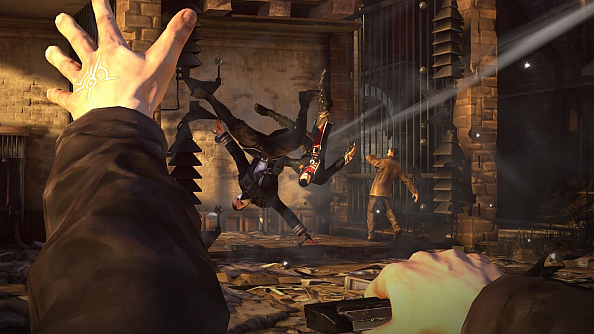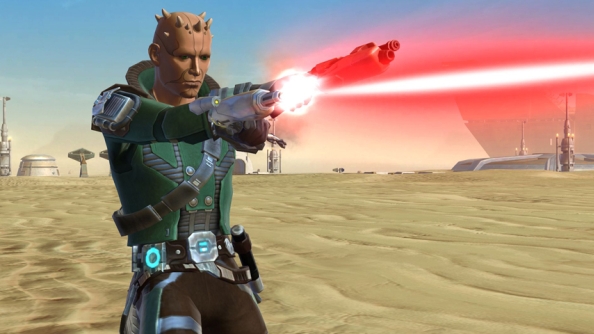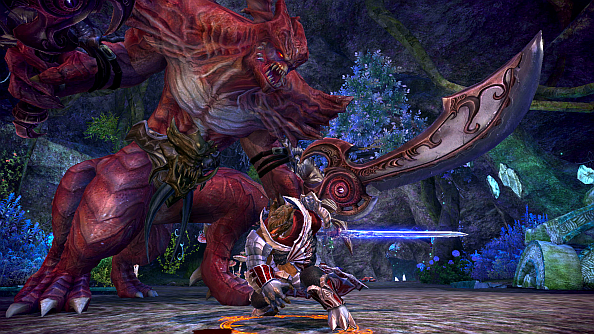It’s the first weekend of February and the snow has finally gone. Without the excuse to stay in doors all week, the playlist this week is a little sparse, but an interesting read nonetheless.
Here are some of the games we’ve been playing this past week:
Tim Edwards: Steam Big Picture Mode, via Dishonored

Here’s a thing I knew but hadn’t seen in person: PCs make better games consoles than actual games consoles.
I’ve redecorated my office/games-room. It’s taken nearly three weeks, and I’m still waiting for the desk I ordered on eBay to actually arrive, but the room itself is starting to take shape. This isn’t vital information. What is vital information is that while I’ve been waiting, I’ve been experimenting heavily with Steam Big Picture Mode.
It started with a spare TV: I’ve inherited an old LCD telly. A Bravia 32” jobby, that was great seven years ago, still works perfectly, but that’s actually worth about 20p on the second hand market. That’s been set up in the office, connected to my PC by quite a long HDMI cable. While I wait for the desk to arrive, it’s been my primary means of playing games.
First of all, Steam Big Picture mode is good, but it’s nowhere near perfect. A lot of the functionality of Steam hasn’t been well implemented: Workshop and Greenlight, for instance, are accessed via a browser rather than built into the interface. Fair enough: that browser is very good: far better than anything the consoles have produced so far – but it’s no substitute for a dedicated controller-centric interface.
On the other hand Steam is moving so fast it doesn’t have to be perfect. It feels such a rich place to be a gamer. Beyond launching games, there’s the guides, workshop, and community forums built in. There’s just so much /stuff/, it’s thrilling. Whereas the Xbox and PS3 interfaces are tightly wound around advertising things to buy, the store in Big Picture Mode is just another piece of the puzzle, equally important as playing and creating. Steam’s community focus embarrases the consoles.
Here’s the other thing about playing PC games on the television: you don’t need a spectacular PC to make them look stunning. While I wait for the desk to arrive, I’ve been working my way through Dishonored. I’d prefer to play it with a mouse and keyboard, but an Xbox controller will do.
The TV I’m using is only 720p. But at that low a resolution, I can crank the settings to maximum, apply all the anti-aliasing possible, and maintain 60 frames per second. And it loads new levels in seconds. It’s gorgeous: Viktor Antonov’s stunning cityscapes rendered impeccably.
This is getting rambly. Apologies if you’ve made it this far.
To get to the point I’m not quite making: I really think that, in the absence of any major reason to upgrade your PC, and if you have the space, consider buying a television for your PC.There’s a steady stream of very cheap LCD televisions appearing on eBay (mine’s going for about £20), and all you’ll need beyond that is a cheap HDMI cable and a wired Xbox 360 pad. What you get in exchange is flexibility and screen area, and a chance to take advantage of what Valve have built. I’m deliriously happy about my new setup. I love Big Picture Mode. It feels magical.
Jeremy Peel: Star Wars: The Old Republic
There are a couple of instances in which single player life in SWTOR breaks down; the music box stops playing, and disbelief falls unceremoniously from its point of suspension like a clumsy nativity angel.
One is the second or so of dissonance that occurs upon entering conversation with a quest-related person – when the time it takes for the server goblins to cue up the chat is precisely long enough to notice the other eight or nine yous and their identical companions who’ve flocked to the same spot.
Another is the (thankfully rare) occasion when players fight to fire the first shot at a respawned boss and so secure themselves the necessary kill to advance – the closest thing online gaming has to a vicious parking spot stakeout.
These issues are common, I’m told, to the great MMOs of old that SWTOR seeks to mimic. Do I wish that SWTOR could retroactively benefit from the genre leaps forward made by Guild Wars 2? The stumbled-upon ongoing quests and the weapon-levelling system? Of course. But here I am, still playing SWTOR.
What GW2 doesn’t offer is any sense of higher-level compulsion to hook and drag you through the game by your bottom lip. Perhaps that’ll change in the coming year, but as it stands it’s the upper-tier writing of The Secret World and SWTOR which provide the best reasons to play a massively multiplayer game solo – as, statistically speaking, we know most of us do.
I have been playing the game with others. Okay? My brother and I are stumbling through the respective machinations of his Sith Inquisitor and my Imperial Agent in tandem, and it’s wonderful – probably the best co-op RPG experience I’ve had in my life.
But sometimes life intervenes, and we’re not available during the same hours. That’s when I warp to Republic space and hurtle through the storyline of my Trooper – a military ensemble piece that’s lately taken me to the heart of a Bond-ian volcano base. I don’t know whether this particular game-within-a-game is KOTOR 3, 4, 5, 6 or 7, but I’m determined to play them all.
Nick Wilson: TERA Online
I’ve been playing TERA for the majority of the week, trying to reach the endgame before the free to play transition. Being at level 34 and with only two days to go, it isn’t looking likely but I’m going to try my best.
I decided to search for some companions to play with since I was playing an MMO. TERA puts all the guilds on the server into a nice list for you to view at your pleasure. It lists their member count, praise and application requirements. Praise is something unique, in which a character can give praise to any guild they wish. This rewards good behaviour and even good diplomatic relations towards other guilds.
Sorting the guild list by praise put a guild called House of Maids right at the top, by quite a large margin. I had seen some of their members around beforehand and even prior to playing on the games forum. I sent in my application, hoping they would accept a new player such as myself.
Half an hour later I was accepted.
In the following days I would learn that I was in a very unique situation. Guilds can declare war on other guilds known as GvG. This isn’t much different from the constant open PvP I’m subject to already because the Ishara server is a PvP world. However being in a GvG earns you points if you slay enemy guild members, with the winning team being those who get the most points.
Suddenly there is a big incentive other than personal glory and infamy. Now I have to be extra careful while questing in case an warring guild comes along to take me by surprise. It’s not even the fact that I could die, but I will give them free points if they slay me. Luckily most of the guilds we have been at war with have a sense of honor and won’t abuse high level players in low level zones (thank you Angel for not hunting me down).
Being in a guild has definitely added more to the whole experience, with more to come. Once we have more players at level 60 we can start to contest the political system by more open warfare and doing Nexuses (public raid content) to attain further glory. A big shout out to Phosphia, Ritsu, Pro and Serifrom House of Maids for helping me learn the game and being great company to boot.
You can find us all on the EU Ishara PvP, my character is named Gelta.
